AIR Discussions (October 3rd Week)
27th October, 2021
AIR SPOTLIGHT: ELIMINATING SINGLE-USE PLASTIC
Context:
- India will ban most single-use plastics by next year as part of its efforts to reduce pollution — but experts say the move is only a first step to mitigate the environmental impact.
- Centre announced the ban in August this year, following its 2019 resolution to address plastic pollution in the country. The ban on most single-use plastics will take effect from July 1, 2022.
- During his Independence Day Speech in 2019 PM had urged the people to take a pledge on Mahatama Gandhi's 150th Anniversary on 2nd October to make the country free of single use plastic.

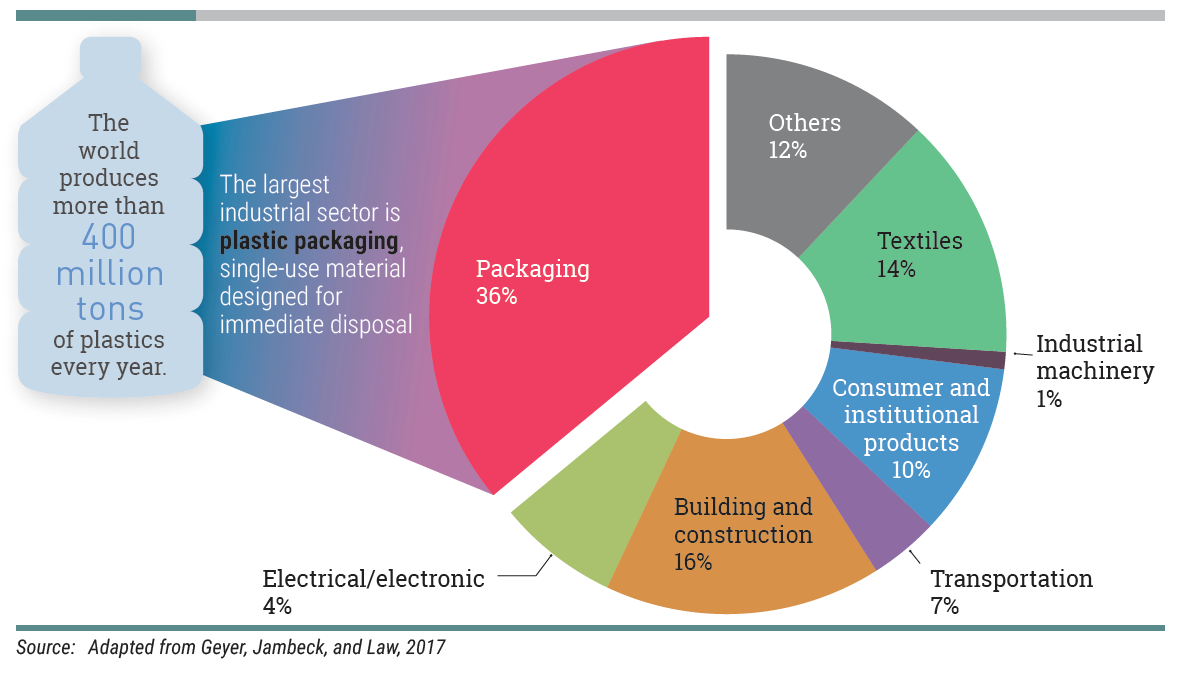
Steps in India:
- Airports Authority of India has declared 55 out 134 airports as single-use plastics free.
- UGC has also written to all universities to initiate a bid to make their premises free of them.
- Some Central government ministries like food and consumers affairs have announced that single-use plastics would not be used in their premises.
- ITC group of hotels and the Rajasthan High Court have made similar announcements.
- Several state governments have announced a ban on single-use plastics such as Maharashtra, Telangana, Himachal Pradesh, Tamil Nadu, Odisha Goa and Andhra Pradesh.
Concerns:
- Industry had raised a major objection, saying that in the absence of any imminent alternative, their sales might drop sharply.
- Such a ban would increase the price of most FMCG products as manufacturers would try and shift to alternative packaging.
- A ban would wipe out various low price point products (those that cost less than Rs 5 such as shampoo sachets, detergent pouches, biscuit packets and others) as production at these price points would become unviable.
- FICCI had also said the Rs 53,000 crore plus segment of the plastic manufacturing industry would be hit because of a ban, leading to job losses.
- Thirteen lakh personnel across 10,000 firms would immediately lose their jobs.
- The food processing industry would suffer from a revenue loss of Rs 90,000 crore.
- However, the major bone of contention remains the fact that there is no central definition of what comprises single use plastics, which may adversely affect any sort of ban.
Plastics:
- Plastic is a lightweight, hygienic and resistant material which can be moulded in a variety of ways and utilized in a wide range of applications.
- Most plastics do not rust/corrode/biodegrade, but instead photodegrade, meaning that they slowly break down into small fragments known as microplastics.
- According to recent estimates, 79% of the plastic waste ever produced now sits in landfills, dumps or in the environment, while about 12% has been incinerated and only 9% has been recycled.
- Impact of plastic Pollution:
- Environmental Pollution:
- Toxic chemicals leach out of plastic through landfill site, is linked to decreasing crop productivity, impacting food security, birth defects, impaired immunity, endocrine disruption and other ailments
- Every year, up to 13 million tons of plastic leak into our oceans, where it smothers coral reefs and threatens vulnerable marine wildlife.
- Disposing of plastic waste by burning it in open-air pits releases harmful gases like furan and dioxin.
- Health Impact: Plastic bags often provide breeding grounds for mosquitoes and pests thus increase the transmission of vector-borne diseases like malaria.
- Bioaccumulation: Plastic bags are often ingested by animals who mistakenly taken them for food due to which toxic chemicals entered the human food chain.
- Financial Loss: The total economic damage to the world’s marine ecosystem caused by plastic amounts to at least $13 billion every year.
- Exuberating Natural Disaster: Encroachment and clogging of city drainage with plastic and solid waste often leads to suburban flooding e.g. Mumbai’s experience of annual flooding like situation during monsoon season due to water clogging etc.
- Social Cost: The social damage continuously being inflicted is inestimable as every sphere of life get affected by it like tourism, recreation, business, the health of humans, animals, fish and birds.
- Challenges in addressing Plastic Pollution:
- Not prioritized by the state authorities- Waste management is the last in the list of priorities of municipal corporations. Many States/UTs have not constituted State Level Monitoring Committee (SLMC) Body to monitor implementation of PWM Rules.
- Lack of expertise- among the state pollution control boards and the dearth of understanding of the scale of the plastic waste challenge.
- Presence of a communication gap between the state and central government officials.
- Poor response of companies/ producers- which are mandated to set up systems either individually or collectively in cities to ensure the collection of non-recyclable waste. They are supposed to submit their plans to states, which has been founding lacking till now.
- Lack of accurate data- Only 14 of India’s 35 state pollution control boards filed information on plastic waste generation in 2017-18, as per CPCB.
- Large-scale presence of informal sector- Over 90 percent of the plastic industry is informal, thus trying to reach and work with these manufacturers becomes a challenge.
Single-use plastics:
- 36% of 400 million tonnes of plastic or disposable plastics are used for plastic packaging, grocery bags, food packaging, bottles, straws, containers, cups and cutlery.
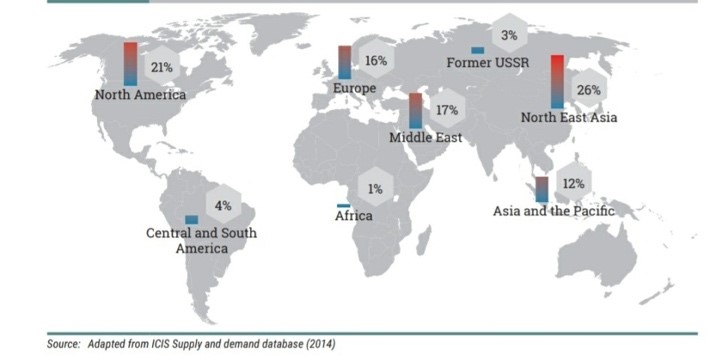
Distribution of single use plastic production
- They are generally used only once before they are thrown away or recycled.
- They have a higher carbon footprint and are more resource and water intensive to produce.
- Many times, the packaging is not effectively collected, ending up in landfills and drains in the cities and these single-use plastic items clog water bodies and finally ending up in the ocean.
- There is higher cost of collection.
- Single-use plastics took most of the spots in Top Ten finds during international coastal cleanups.
- In addition to people’s negligence, the large presence of single-use plastics in the environment is symptomatic of poor or failing waste management systems.
Plastic Waste Management Rules, 2016 (as amended in 2018):
- Defines minimum thickness of plastic carry bags e. 50 microns.
- Gram sabha will implement the rules in rural areas.
- Producers and brand owners will have extended producer responsibility.
- Waste Generator shall segregate and store their waste and handover it to authorized waste disposal facilities.
- Only the registered shopkeepers on payment of a registration fee to local bodies would be allowed to give out plastic carry bags on charge.
- Producer will keep a record of vendors to whom he/she has supplied raw materials for manufacturing.
- A Central Registration System for the registration of the producer/importer/ owner.
Way Forward:
- 10-point roadmap for policymakers:
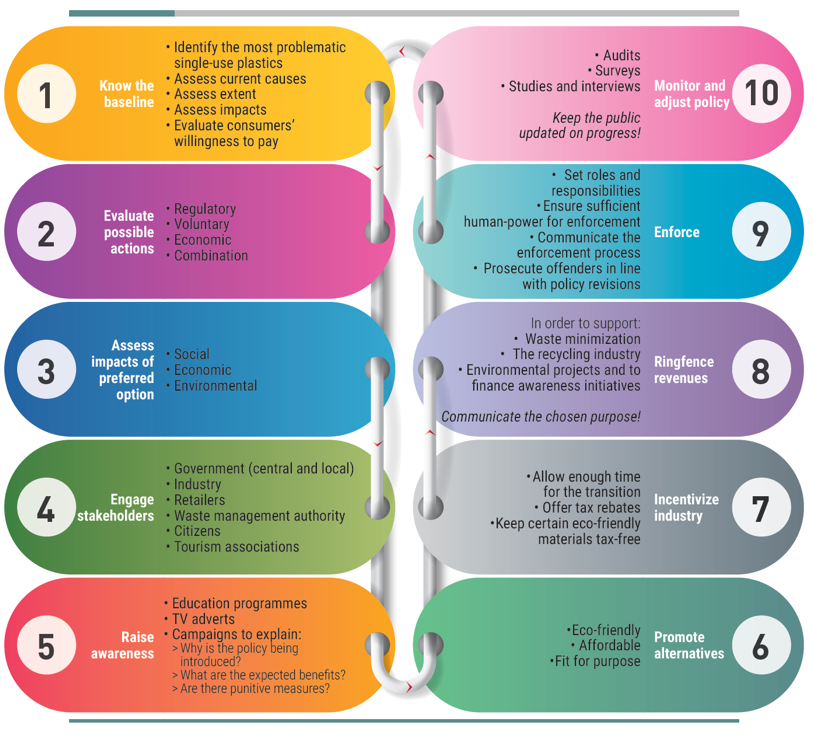
- Examples of policy instruments to minimize single use plastics:
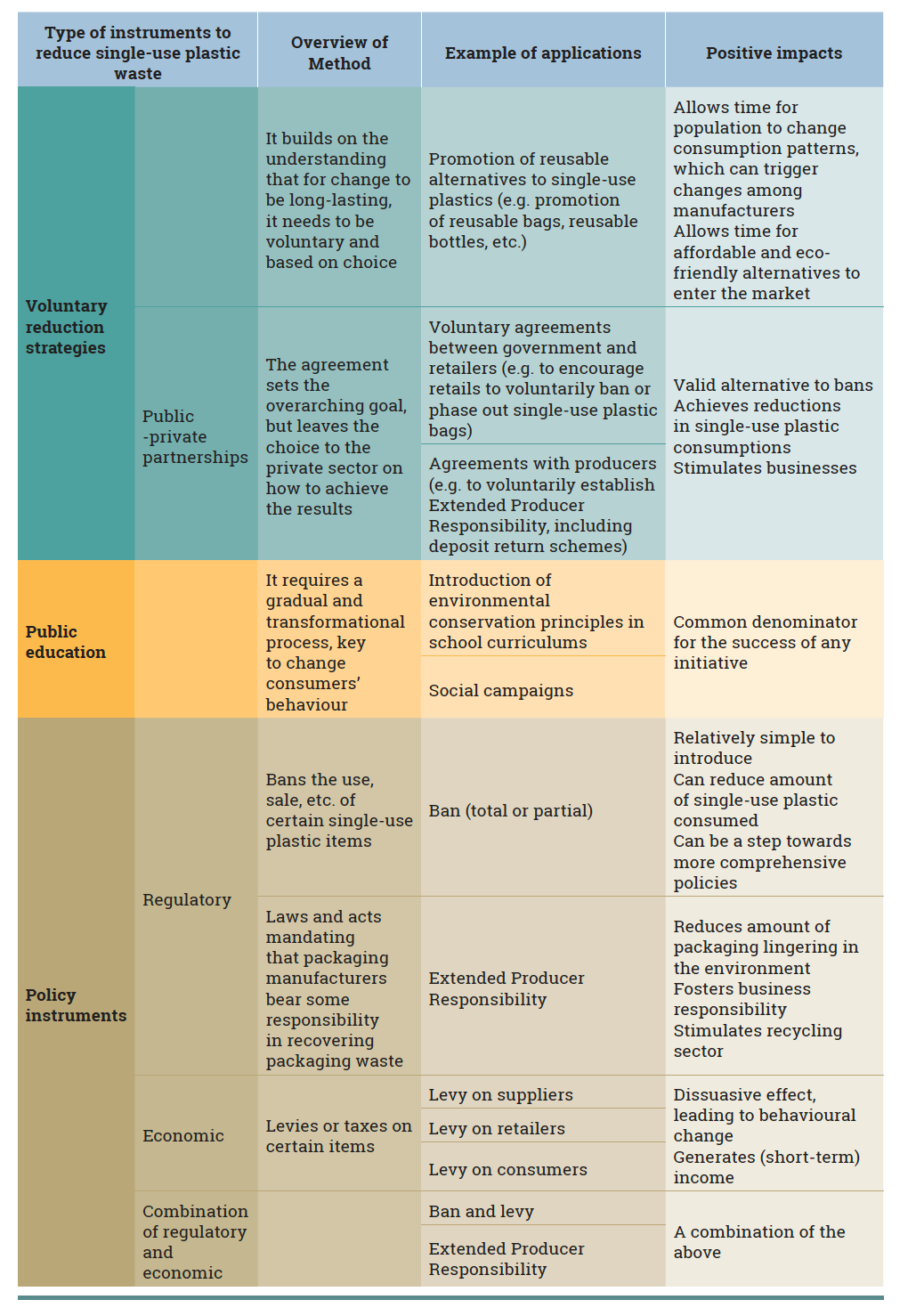
SOURCES:
- https://www.google.com/url?sa=t&source=web&rct=j&url=http://wedocs.unep.org/bitstream/handle/20.500.11822/25496/singleUsePlastic_sustainability.pdf%3FisAllowed%3Dy%26sequence%3D1&ved=2ahUKEwi1vdCRxITlAhUCSY8KHZDNC_8QFjABegQIDBAG&usg=AOvVaw2sv7_gstLPlUIw8tLvK7w0
- https://youtu.be/AzQvWDdOM0c
- https://m.economictimes.com/news/politics-and-nation/india-shelves-plan-on-countrywide-ban-on-single-use-plastic-products/amp_articleshow/71402017.cms
- https://www.downtoearth.org.in/news/pollution/amp/no-ban-on-single-use-plastics-to-be-phased-out-by-2022-67064
- https://www.cnbc.com/2021/10/11/india-to-ban-single-use-plastics-but-experts-say-more-must-be-done-to.html
NEWS IN BRIEF: PRELIMS SPECIAL
e-Shram Portal
- More than 4 crore unorganized workers registered at e-Shram Portal.
- All unorganized workers including migrant workers can now take the benefits of various social security and employment-based schemes through registration at the e-Shram portal.
- The largest number of workers registered is from agriculture and construction, given the sheer volume of these two sectors in employment generation in India.
- Aim: To register 38 crore unorganised workers such as construction labourers, migrant workforce, street vendors, and domestic workers, among others.
- The workers will be issued an e-Shram card containing a 12 digit unique number.
- If a worker is registered on the eSHRAM portal and meets with an accident, he will be eligible for Rs 2.0 Lakh on death or permanent disability and Rs 1.0 lakh on partial disability.
https://newsonair.com/2021/10/17/146728/
Geospatial Energy Map of India
- NITI Aayog in collaboration with ISRO has developed a comprehensive Geographic Information System (GIS) Energy Map of India with the support of Energy Ministries of Government of India.
- The GIS map provides a holistic picture of all energy resources of the country which enables visualisation of energy installations such as conventional power plants, oil and gas wells, petroleum refineries, coal fields and coal blocks, district-wise data on renewable energy power plants and renewable energy resource potential, etc. through 27 thematic layers.
- The map attempts to identify and locate all primary and secondary sources of energy and their transportation/transmission networks to provide a comprehensive view of energy production and distribution in the country.
- The GIS-based energy map of India may be useful for geospatial planning of resource.
- This may also help in resource and environmental conservation measures, inter-state coordination on infrastructure planning including different corridors of energy and road transport highway.
- It will also aid in disaster management and making investment decisions.
Kushinagar
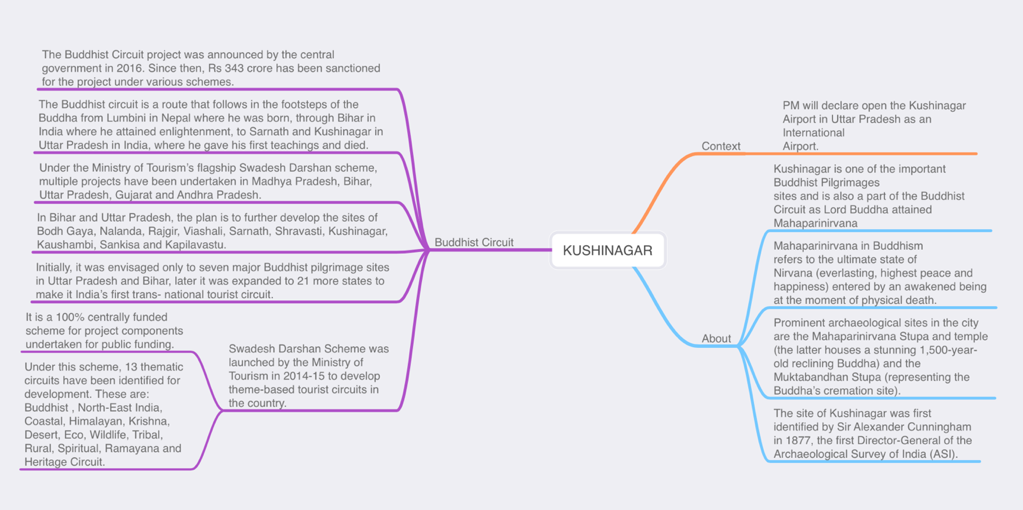



1.png)
